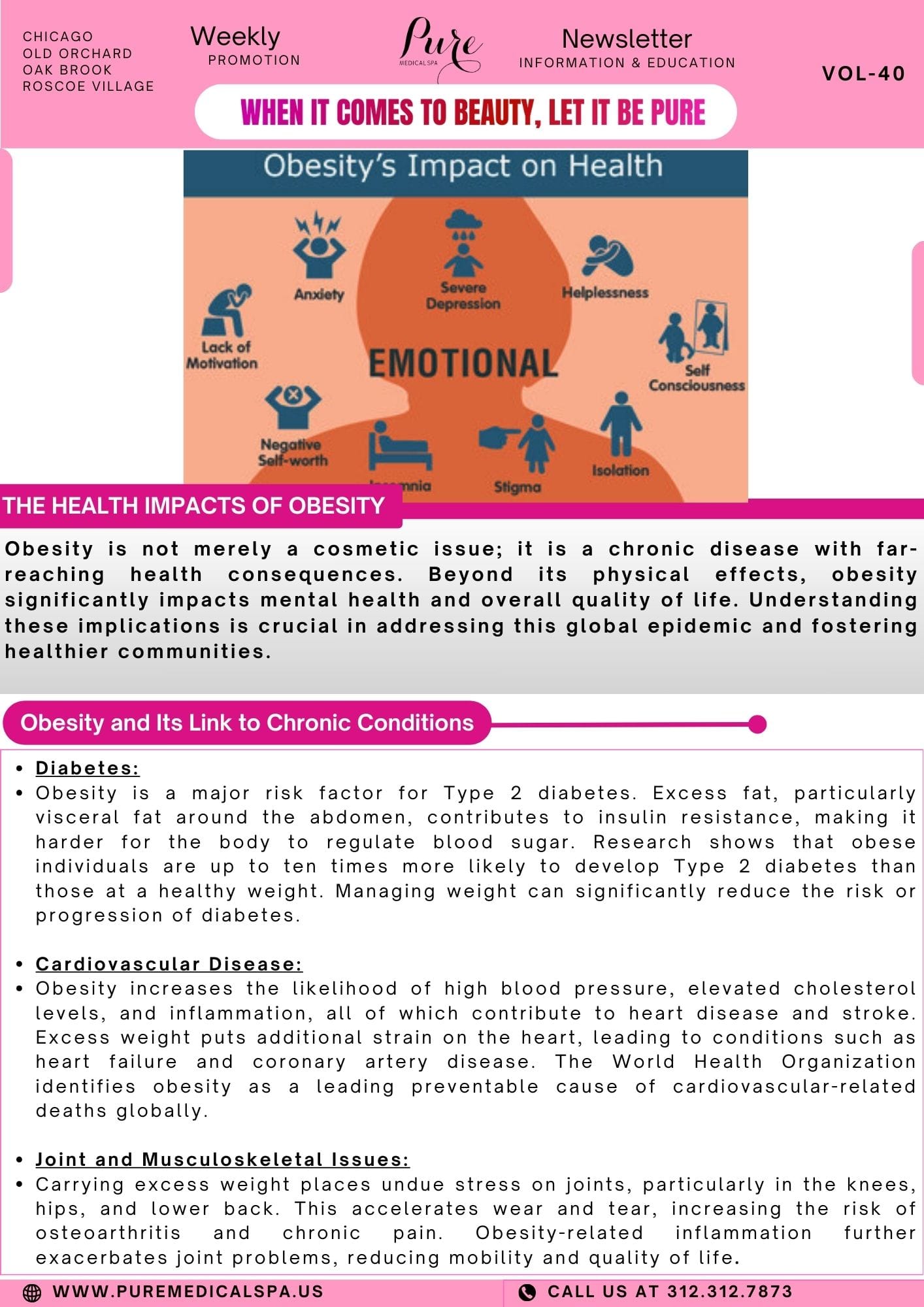Obesity is not merely a cosmetic issue; it is a chronic disease with far-reaching health consequences. Beyond its physical effects, obesity significantly impacts mental health and overall quality of life. Understanding these implications is crucial in addressing this global epidemic and fostering healthier communities.
Obesity and Its Link to Chronic Conditions
- Diabetes:
Obesity is a major risk factor for Type 2 diabetes. Excess fat, particularly visceral fat around the abdomen, contributes to insulin resistance, making it harder for the body to regulate blood sugar. Research shows that obese individuals are up to ten times more likely to develop Type 2 diabetes than those at a healthy weight. Managing weight can significantly reduce the risk or progression of diabetes. - Cardiovascular Disease:
Obesity increases the likelihood of high blood pressure, elevated cholesterol levels, and inflammation, all of which contribute to heart disease and stroke. Excess weight puts additional strain on the heart, leading to conditions such as heart failure and coronary artery disease. The World Health Organization identifies obesity as a leading preventable cause of cardiovascular-related deaths globally. - Joint and Musculoskeletal Issues:
Carrying excess weight places undue stress on joints, particularly in the knees, hips, and lower back. This accelerates wear and tear, increasing the risk of osteoarthritis and chronic pain. Obesity-related inflammation further exacerbates joint problems, reducing mobility and quality of life.
Mental Health Impacts
- Stigma and Discrimination:
Obesity is often stigmatized, leading to social discrimination in workplaces, healthcare settings, and personal relationships. Such experiences can negatively impact self-esteem and mental health, perpetuating feelings of shame, isolation, and inadequacy. - Emotional Well-Being:
Depression and anxiety are significantly more common in individuals with obesity. This is partly due to the societal pressures and internalized weight bias, as well as the physiological effects of obesity on brain health. Chronic stress and low self-esteem can lead to emotional eating, further perpetuating the cycle of weight gain. - Cognitive Function:
Emerging research suggests that obesity may impair cognitive function and increase the risk of dementia. Inflammation and metabolic changes caused by obesity can negatively affect brain health, underscoring the importance of early intervention.
The Importance of Early Intervention
- Preventing Disease Progression:
Addressing obesity early can prevent or mitigate the onset of related conditions like diabetes and cardiovascular disease. Lifestyle changes, medical treatments, and consistent monitoring can significantly improve outcomes. - Enhancing Quality of Life:
Early intervention can improve physical mobility, reduce chronic pain, and enhance mental well-being. Losing even 5-10% of body weight can yield significant health benefits, including better blood sugar control, reduced blood pressure, and improved cholesterol levels. - Breaking the Cycle of Obesity:
Delaying intervention allows obesity-related complications to worsen, making it harder to address. Early action, including education on healthy eating, exercise, and medical options, can disrupt the cycle of weight gain and associated health issues.
Call to Action
Understanding the health impacts of obesity is the first step in combating this global health crisis. By recognizing obesity as a disease and addressing it with empathy and evidence-based strategies, we can pave the way for healthier individuals and communities. If you or a loved one is struggling with obesity, reach out to a healthcare provider for support and guidance. Early action can make all the difference in achieving a healthier, happier life.



